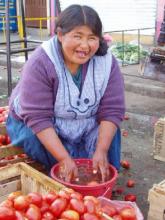Institutions
This report (in Spanish) documents experiences with PROMIC and the Belgian Technical Cooperation project in the Vinto area to design and construct multiple use water supply systems in the Vinto area.
This report captures the main proceedings, points of discussion and conclusions emanating from the symposium.
John Butterworth, Martin Keijzer, Ian Smout and Fitsum Hagos (Eds). Proceedings of the International Symposium Multiple-Use Services; from Practice to Policy. 4-6 November 2008, Addis Ababa, Ethiopia
- Read more about Proceedings: Intl Symposium on Multiple-Use Services 2008
- Google Scholar
- BibTeX
- Tagged
S. Smits, B. van Koppen and P. Moriarty: Characterising the multiple use approach at community level: findings from case studies in 8 countries
Multiple-use services (MUS) have gained increased attention, as an approach to of providing water services that meet people’s multiple water needs in an integrated manner. This paper tries to characterise key elements of mus at community level, and assesses performance through a review of case studies conducted in Bolivia, Colombia, Ethiopia, India, Nepal, South Africa, Thailand and Zimbabwe. The cases show that people almost universally use water for domestic and productive activities at and around the homestead. The case studies demonstrate how levels of access can be provided by different types and combinations of technologies, and incremental changes made. These need to be accompanied by additional financial and management measures to ensure sustainability of services. The additional requirements posed are considered not to be insurmountable and can all be addressed in a feasible manner, and often justified by the additional benefits. [authors abstract]
Powerpoint presentation by Stef Smits, IRC, given at the Thematic Group Meeting in London, 2007.
Is something missing from your work in water supply? Do individuals and communities that you work with use their water supplies for multiple purposes? Are you challenged by how to help the poor gain access to water (beyond 'traditional' domestic or field-scale irrigation needs) for activities that generate food and income like fruit and vegetable production, keeping livestock, brick-making and building, and a wide range of informal micro-enterprises? Do you search for ways to improve cost-recovery?
Beyond domestic contains:
- evidence of how multi-purpose water supplies can help poor women and men to build sustainable livelihoods and fight poverty;
- analysis of the key issues relating to productive uses of water at the household level;
- details of practical experience on how to cater to the demand for productive water;
- links to further information and contacts.
The book will inspire and support professionals seeking to move beyond sectoral boundaries in domestic or irrigation water supply, and contains many suggestions for an agenda of policy change, implementation and further research.
Beyond domestic is jointly published by IRC International Water and Sanitation Centre, the Natural Resources Institute (NRI) and the International Water Management Institute (IWMI).
The full publication may be downloaded from the IRC website. A hard copy of the publication is also available. Please contact IRC at publications@irc.nl

